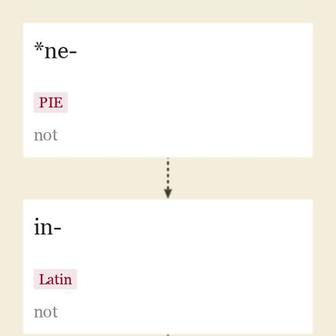improbable (adj.)
1590年代,源自于 in-(1)“不,相反”的合成形式和 probable,或者源自于拉丁语 improbabilis。相关词汇: Improbably。
最早记录年份: 1590s
improbable 的相关词汇
in- (1)

这个词缀的意思是“不,相反,没有”(也可以是通过与后面的辅音音节化的 -n- 的同化而来的 im-, il-, ir-,这种趋势始于后期拉丁语),源自拉丁语 in- “不”,与希腊语 an-,古英语 un- 同源,均来自 PIE 词根 *ne- “不”。
在古法语和中古英语中,通常使用 en-,但大多数这些形式在现代英语中已经不再使用,只有极少数(例如 enemy)不再被视为否定的。在英语中的经验法则是,对于明显的拉丁语元素使用 in-,对于本土或本土化的元素使用 un-。
probable (adj.)
14世纪后期,“可能的,合理的,似乎有更多的证据支持而非反对”的意思,来自于14世纪的古法语 probable “可证明的,可证实的”,源自于拉丁语 probabilis “值得认可的,令人愉悦的,令人满意的; 可证明的,可以被认为是可信的”,源自于 probare “尝试,测试”(见 prove)。作为一个法律术语, probable cause “合理的原因或理由”可追溯至1670年代。
Probable cause (used with reference to criminal prosecutions), such a state of facts and circumstances as would lead a man of ordinary caution and prudence, acting conscientiously, impartially, reasonably, and without prejudice, upon the facts within his knowledge, to believe that the person accused is guilty. [Century Dictionary]
合理怀疑(用于刑事起诉),指这样一种事实和情况,即在他所知道的事实的基础上,一个具有普通谨慎和审慎,以及在没有偏见的情况下,按照良心和理性的原则行事的人,会相信被告有罪。[世纪词典]
相关词汇: Probableness。
improbability (n.)
1590年代,“不太可能的事实或品质”; 见 improbable + -ity。意思是“不太可能的事例”来自1610年代。